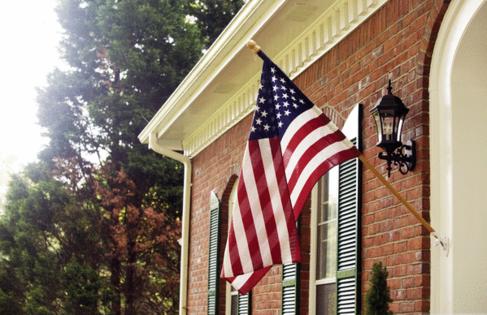American pride drops to new low, poll finds. How has it changed over decades?
Published in News & Features
A record-low share of Americans feel strong pride in their national identity, according to new polling, which underscores a profound shift in public sentiment that has transpired over the last two decades.
In the latest Gallup survey, 58% of respondents said they are extremely or very “proud to be an American.” This marks a significant decline from last year, and is the lowest such figure recorded since 2001, the first year Gallup asked this question.
That said, there were major partisan differences, with Republicans being far more likely to express high levels of pride than Democrats, according to the poll, which sampled 1,000 adults June 2-19.
Here is how American pride has shifted over time:
Declining pride
At the turn of the century, nearly every U.S. adult felt great pride in being American. But, over the ensuing years — against the backdrop of foreign wars, divisive domestic politics and a global pandemic — patriotic fervor has waned.
In January 2001, the vast majority of poll respondents, 87%, said they were very or extremely proud to be an American.
Then, following the Sept. 11 terrorist attacks, attitudes changed somewhat. In 2002, 2003 and 2004, a record-high 91% or 90% of U.S. adults said they had a great deal of pride in their country.
However, by 2005 — two years into the Iraq War — this figure dropped to 83% and never again reached its previous highs.
Over the next decade, the share of adults expressing great pride in their national identity remained relatively constant, hovering in the mid- to low-80s.
But, between 2016 and 2017 — during which time President Donald Trump was first elected to office — it dropped from 81% to 75%. Throughout Trump’s first term, it continued to slide, plummeting to 63% by 2020, the first year of the COVID-19 pandemic.
Then, in 2021, following then-President Joe Biden’s election, the share of adults expressing a great deal of pride rose to 69%. By 2022, it fell again to 65% before leveling off at 67% in 2023 and 2024.
Now, during the first year of Trump’s second term in office, this figure stands at 58%, having fallen nine points, according to the poll, which has a margin of error of 4 percentage points.
Partisan divide
While there has been a noticeable decline in American pride, it has largely played out on just one side of the political spectrum.
Over the last two decades, the share of Democrats expressing a great deal of national pride has fallen dramatically, tracking closely with Democratic control of the White House.
In 2001, 87% of Democrats said they were very or extremely proud to be an American. This fell to 78% by 2008, then-President George W. Bush’s last year in office. During former President Barack Obama’s time in office, this figure remained in the 80s.
But, during Trump’s first term, Democratic pride plummeted, reaching 42% by 2020. It then jumped back up during Biden’s tenure, before falling to a record-low 36% this year.
Meanwhile, the share of Republicans expressing a great deal of pride in being American has largely held steady over time.
It peaked at 99% in 2003 and reached an all-time low of 84% in 2022. Now, it stands at 92%, having shot up seven points from 85% in 2024.
_____
© 2025 The Herald (Rock Hill, S.C.). Visit www.heraldonline.com. Distributed by Tribune Content Agency, LLC.







Comments